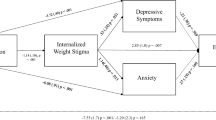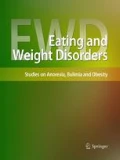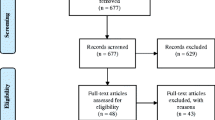Abstract
While much research has focused on overeating when exploring constructs of mindfulness, mindful eating, and self-compassion, there is limited research on the specific relationship of these constructs with consumption of energy-dense foods that have a large impact on weight regulation. In a cross-sectional study, university students (n = 546) were recruited to explore the relationship between mindfulness, mindful eating, self-compassion, and fat and/or sugar consumption. Results indicated that all constructs were negatively related to fat and sugar consumption, but self-compassion did not do so in a univariate fashion. When investigating subscales, negative aspects such as isolation and over-identification show a significant positive relationship to fat and sugar consumption. Possible explanations and future directions are discussed further with an emphasis on the need for more empirical work.
Level of Evidence: Level V, cross-sectional descriptive study.
Similar content being viewed by others

References
Drewnowski A (1989) Sensory preferences for fat and sugar in adolescence and adult life. Ann NY Acad Sci 561:243–250. https://doi.org/10.1111/j.1749-6632.1989.tb20986.x
Drewnowski A, Popkin BM (1997) The nutrition transition: new trends in the global diet. Nutr Rev 55:31–43. https://doi.org/10.1111/j.1753-4887.1997.tb01593.x
Hu FB, Rimm EB, Stampfer MJ, Ascherio A, Spiegelman D, Willett WC (2000) Prospective study of major dietary patterns and risk of coronary heart disease in men. Am J Clin Nutr 74:912–921
Popkin BM (2006) Global nutrition dynamics: the world is shifting rapidly toward a diet linked with noncommunicable diseases. Am J Clin Nutr 84:289–298
Mathers C, Fat DM, Boerma JT (2008) The global burden of disease: 2004 update. World Health Organization, Geneva
World Health Organization (2003) Diet, nutrition and the prevention of chronic diseases: report of a joint WHO/FAO expert consultation. World Health Organization, Geneva
Gidding SS, Dennison BA, Birch LL, Daniels SR, Gilman MW, Lichtenstein AH, Rattay KT, Steinberger J, Stettler N, Horn LV (2006) Dietary recommendations for children and adolescents: a guide for practitioners. Pediatrics 117:544–559. https://doi.org/10.1542/peds.2005-2374
McGuire S (2011) US department of agriculture and US department of health and human services, dietary guidelines for Americans, 2010. Washington, DC: US government printing office, January 2011. Adv Nutr 2:293–294. https://doi.org/10.3945/an.111.000430
McGuire S, Ervin RB, Kit BK, Carroll MD, Ogden CL (2012) Consumption of added sugar among US children and adolescents, 2005–2008. NCHS data brief no 87. Hyattsville, MD: National Center for Health Statistics. Adv Nutr 3:534. https://doi.org/10.3945/an.112.002279
Park S, Blanck HM, Sherry B, Brener N, O’Toole T (2012) Factors associated with sugar-sweetened beverage intake among United States high school students. J Nutr 142:306–312. https://doi.org/10.3945/jn.111.148536
TeMorenga L, Mallard S, Mann J (2012) Dietary sugars and body weight: systematic review and meta-analyses of randomised controlled trials and cohort studies. Br Med J 346:e7492. https://doi.org/10.1136/bmj.e7492
Kabat-Zinn J (1990) Full catastrophe living; how to cope with stress, pain and illness using mindful meditation. Little, Brown Book Group, London
Kabat-Zinn J (2006) Coming to our senses: healing ourselves and the world through mindfulness. Hyperion, New York
Grossman P, Van Dam NT (2011) Mindfulness, by any other name… trials and tribulations of sati in western psychology and science. Contemp Buddhism 12:219–239. https://doi.org/10.1080/14639947.2011.564841
Grossman P (2013) Kindness and compassion as integral to mindfulness—experiencing the knowable in a special way. In: Singer T, Bolz M (eds) Compassion: bridging practice and science. Max Planck Society, Munich, pp 192–207
Neff KD (2003) The development and validation of a scale to measure self-compassion. Self Identity 2:223–250. https://doi.org/10.1080/15298860309027
Neff KD (2003) Self-compassion: an alternative conceptualization of a healthy attitude toward oneself. Self Identity 2:85–101. https://doi.org/10.1080/15298860309032
Neff KD (2011) Self-compassion, self-esteem, and well-being. Soc Personal Psychol Compass 5:1–12. https://doi.org/10.1111/j.1751-9004.2010.00330.x
Herman CP, Mack D (1975) Restrained and unrestrained eating. J Pers 43:647–660. https://doi.org/10.1111/j.1467-6494.1975.tb00727.x
Adams CE, Leary MR (2007) Promoting self-compassionate attitudes towards eating among restrictive and guilty eaters. J Soc Clin Psychol 26:1120–1144. https://doi.org/10.1521/jscp.2007.26.10.1120
Mantzios M, Wilson JC, Linnell M, Morris P (2014) The role of negative cognitions, intolerance of uncertainty, mindfulness, and self-compassion in weight regulation among male army recruits. Mindfulness 6:545–552. https://doi.org/10.1007/s12671-014-0286-2
Mantzios M, Giannou K (2014) Group vs. Single mindfulness meditation: exploring avoidance, impulsivity and weight management in two separate mindfulness meditation settings. Appl Psychol Heal Well Being 6(2):173–191. https://doi.org/10.1111/aphw.12023
Mantzios M, Wilson JC (2015) Mindfulness, eating behaviours, and obesity: a review and reflection on current findings. Cur Obes Rep 4(1):141–146. https://doi.org/10.1007/s13679-014-0131-x
Mantzios M, Wilson JC (2014) Making concrete construals mindful: a novel approach for developing mindfulness and self-compassion to assist weight loss. Psychol Heal 29:422–441. https://doi.org/10.1080/08870446.2013.863883
Hussein M, Egan H, Mantzios M (2017) Mindful construal diaries: a less anxious, more mindful, and more self-compassionate method of eating. Sage Open. https://doi.org/10.1177/2158244017704685
Ferreira C, Pinto-Gouveia J, Duarte C (2013) Self-compassion in the face of shame and body image dissatisfaction: Implications for eating disorders. Eat Behav 14(2):207–210. https://doi.org/10.1016/j.eatbeh.2013.01.005
Chernyak Y, Lowe MR (2010) Motivations for dieting: drive for thinness is different from drive for objective thinness. J Abnorm Psychol 119:276–281. https://doi.org/10.1037/a0018398
Conradt M, Dierk JM, Schlumberger P, Rauh E, Hebebrand J, Rief W (2008) Who copes well? Obesity-related coping and its associations with shame, guilt, and weight loss. J Clin Psychol 64:1129–1144. https://doi.org/10.1002/jclp.20501
Gavin AR, Simon GE, Ludman EJ (2010) The association between obesity, depression, and educational attainment in women: the mediating role of body image dissatisfaction. J Psychosom Res 69:573–581. https://doi.org/10.1016/j.jpsychores.2010.05.001
Palmeira L, Pinto-Gouveia J, Cunha M (2017) Exploring the efficacy of an acceptance, mindfulness and compassionate-based group intervention for women struggling with their weight (Kg-Free): a randomized controlled trial. Appetite 112(Supplement C):107–116. https://doi.org/10.1016/j.appet.2017.01.027
Birnie K, Speca M, Carlson LE (2010) Exploring self-compassion and empathy in the context of mindfulness-based stress reduction (MBSR). Stress Heal 26:359–371. https://doi.org/10.1002/smi.1305
Gall K, van Zutven K, Lindstrom J, Bentley C, Gratwick-Sarll K, Harrison C, Lewis L, Mond J (2016) Obesity and emotional well-being in adolescents: roles of body dissatisfaction, loss of control eating, and self-rated health. Obesity 24:837–842. https://doi.org/10.1002/oby.21428
Torres SJ, Nowson CA (2007) Relationship between stress, eating behavior, and obesity. Nutrition 23:887–889. https://doi.org/10.1016/j.nut.2007.08.008
Hollis-Walker L, Colosimo K (2011) Mindfulness, self-compassion, and happiness in non-meditators: a theoretical and empirical examination. Personal Individ Diff 50:222–227. https://doi.org/10.1016/j.paid.2010.09.033
Shapiro SL, Astin JA, Bishop SR, Cordova M (2005) Mindfulness-based stress reduction for health care professionals: results from a randomized trial. Int J Stress Manag 12:164–176. https://doi.org/10.1037/1072-5245.12.2.164
Van Dam NT, Sheppard SC, Forsyth JP, Earleywine M (2011) Self-compassion is a better predictor than mindfulness of symptom severity and quality of life in mixed anxiety and depression. J Anx Dis 25:123–130. https://doi.org/10.1016/j.janxdis.2010.08.011
Goossens L, Braet C, Van Vlierberghe L, Mels S (2009) Loss of control over eating in overweight youngsters: the role of anxiety, depression and emotional eating. Eur Eat Dis Rev 17:68–78. https://doi.org/10.1002/erv.892
Dallman MF (2010) Stress-induced obesity and the emotional nervous system. Trends Endocrinol Metab 21:159–165. https://doi.org/10.1016/j.tem.2009.10.004
Sirois FM, Kitner R, Hirsch JK (2015) Self-compassion, affect, and health-promoting behaviours. Heal Psychol (APA) 34:661–669. https://doi.org/10.1037/hea0000158
Mantzios M, Wilson JC (2015) Exploring mindfulness and mindfulness with self-compassion-centered interventions to assist weight loss: theoretical considerations and preliminary results of a randomized pilot study. Mindfulness 6:824–835. https://doi.org/10.1007/s12671-014-0325-z
Jordan CH, Wang W, Donatoni L, Meier BP (2014) Mindful eating: trait and state mindfulness predict healthier eating behavior. Personal Individ Diff 68:107–111. https://doi.org/10.1016/j.paid.2014.04.013
Mason AE, Epel ES, Kristeller J, Moran PJ, Dallman M, Lustig RH, Daubenmier J (2016) Effects of a mindfulness-based intervention on mindful eating, sweets consumption, and fasting glucose levels in obese adults: data from the SHINE randomized controlled trial. J Behav Med 39(2):201–213. https://doi.org/10.1007/s10865-015-9692-8
Mason AE, Epel ES, Aschbacher K, Lustig RH, Acree M, Kristeller J et al (2016) Reduced reward-driven eating accounts for the impact of a mindfulness-based diet and exercise intervention on weight loss: data from the SHINE randomized controlled trial. Appetite 100:86–93
Black DS, Sussman S, Johnson CA, Milam J (2012) Psychometric assessment of the mindful attention awareness scale (MAAS) among Chinese adolescents. Assessment 19:42–52. https://doi.org/10.1177/1073191111415365
Bohlmeijer E, ten Klooster PM, Fledderus M, Veehof M, Baer R (2011) Psychometric properties of the five facet mindfulness questionnaire in depressed adults and development of a short form. Assessment 18(3):308–320
Baer RA, Smith GT, Hopkins J, Krietemeyer J, Toney L (2006) Using self-report assessment methods to explore facets of mindfulness. Assessment 13(1):27–45
Hulbert-Williams L, Nicholls W, Joy J, Hulbert-Williams N (2014) Initial validation of the mindful eating scale. Mindfulness 5(6):719–729
Karlsson J, Persson LO, Sjöström L, Sullivan M (2000) Psychometric properties and factor structure of the Three-Factor Eating Questionnaire (TFEQ) in obese men and women. Results from the Swedish Obese Subjects (SOS) study. Int J Obes 24(12):1715
Stunkard AJ, Messick S (1985) The three-factor eating questionnaire to measure dietary restraint, disinhibition and hunger. J Psychosom Res 29(1):71–83
Francis H, Stevenson R (2013) Validity and test–retest reliability of a short dietary questionnaire to assess intake of saturated fat and free sugars: a preliminary study. J Hum Nutr Diet 26(3):234–242
Mantzios M, Egan HH (2017) On the role of self-compassion and self-kindness in weight regulation and health behaviour change. Front Psychol 8:229. https://doi.org/10.3389/fpsyg.2017.00229
Papadaki A, Hondros G, Scott JA, Kapokefalou M (2007) Eating habits of University students living at, or away from home in Greece. Appetite 49(1):169–176. https://doi.org/10.1016/j.appet.2007.01.008
Anding JD, Suminski RR, Boss L (2010) Dietary intake, body mass index, exercise, and alcohol: are college women following the dietary guidelines for Americans? J Am Coll Heal 49(4):167–171. https://doi.org/10.1080/07448480109596299
Huang TK, Harris KJ, Lee RE, Nazir N, Born W, Kaur H (2010) Assessing overweight, obesity, diet, and physical activity in college students. J Am Coll Heal 52(2):83–86. https://doi.org/10.1080/07448480309595728
Anderson LM, Reilly EE, Schaumberg K, Dmochowski S, Anderson DA (2016) Contributions of mindful eating, intuitive eating, and restraint to BMI, disordered eating, and meal consumption in college students. Eat Weight Disord 21(1):83–90. https://doi.org/10.1007/s40519-015-0210-3
Tribole E, Resch E (1995) Intuitive eating: a recovery book for the chronic dieter: rediscover the pleasures of eating and rebuild your body image
Bacon L, Stern JS, Van Loan MD, Keim NL (2005) Size acceptance and intuitive eating improve health for obese, female chronic dieters. J Am Diet Assoc 105(6):929–936. https://doi.org/10.1016/j.jada.2005.03.011
Denny KN, Loth K, Eisenberg ME, Neumark-Sztainer D (2013) Intuitive eating in young adults. Who is doing it, and how is it related to disordered eating behaviors? Appetite 60:13–19. https://doi.org/10.1016/j.appet.2012.09.029
Author information
Authors and Affiliations
Corresponding author
Ethics declarations
Conflict of interest
The authors declare that they have no conflict of interest.
Ethical standards
The study was approved by the Ethical Review Board of the University, and was in accordance with the ethical standards of the institutional and/or national research committee, and with the 1964 Helsinki Declaration and its later amendments. Informed written consent was obtained prior to the experiment. This article does not contain any studies with animals.
Informed consent
All participants were provided with a participant information sheet which outlined the aims and objectives of the research, assured confidentiality and informed participants of their right to withdraw. Participants were provided with a participant number in order that they could contact the lead researcher for up to two weeks after completed the study if they wished to withdraw their data. Participants gave consent online by clicking a consent button once they had completed the study.
Data availability
The data that support the findings of this study are available on request from the corresponding author. The data are not publicly available due to public availability violating the consent that was given by research participants.
Rights and permissions
About this article
Cite this article
Mantzios, M., Egan, H., Hussain, M. et al. Mindfulness, self-compassion, and mindful eating in relation to fat and sugar consumption: an exploratory investigation. Eat Weight Disord 23, 833–840 (2018). https://doi.org/10.1007/s40519-018-0548-4
Received:
Accepted:
Published:
Issue Date:
DOI: https://doi.org/10.1007/s40519-018-0548-4



